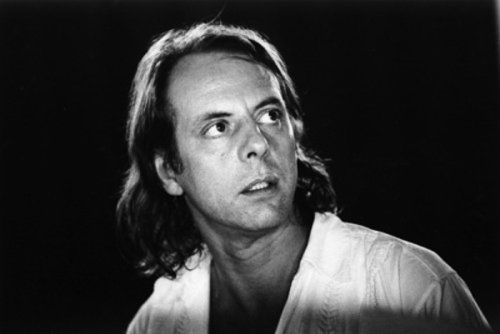Program includes: Tom Johnson, An Hour For Piano (1971) and Philip Glass, "Knee Plays" from Einstein on the Beach (1976).
Line-up includes: Joseph Kubera (piano); Mary Rowell (violin, arrangements); Geoff Burleson and Joseph Kubera (organs); Eve Beglarian and Ekmeles vocal ensemble (voices).
Two cornerstones of New York minimalism are featured in the grand finale of ISSUE's Darmstadt: Essential Repertoire 2010.
Mary Rowell—protean force on the new music scene and co-founder of crossover string quartet Ethel—will perform her arrangement of the Knee Plays from Philip Glass and Robert Wilson's opera epic, Einstein on the Beach, a five-hour work with a libretto consisting of mainly solfège syllables, numbers, and spoken texts that bear no connection to the opera's namesake (or perhaps anything, for that matter). The Knee Plays contain all of the main compositional material that gets expanded upon throughout the work, and Rowell has arranged them with supplemental material—the Bed Aria and music from Spaceship movements—to create a 45-minute suite for speakers, singers, and organists, led by the virtuosic arpeggiations of her violin.
Philip Glass (born 1937) is one of the most successful composers to emerge from New York's "downtown music" scene of the early 1970s. His brand of minimalism merged Eastern concepts of time with Western classicism and amplified sound design, in conjunction with his own ensemble. Glass's early works adhere to strict procedural methods of addition and subtraction of melodic material. Einstein on the Beach is perhaps a transitional work in that it incorporates tonal cadences within the framework of epic abstraction. As the sound of minimalism took on a more populist appeal towards the late 1970s, Glass moved towards writing film scores, notably Koyaanisqatsi, his crossover album, Glassworks, and many others. Glass has a prolific output of symphonies, operas, film scores, and chamber works under his belt.
Hailed by Village Voice critic Kyle Gann as one of “new music’s most valued performers,” Joseph Kubera performs Tom Johnson's An Hour For Piano, a trance-like series of repeated cells that poet and UBUWeb founder Kenneth Goldsmith has called “a philosophical exercise which calls into question our relationship to music as a listener.” The piece alternately calls to mind early musical minimalism and the “furniture music” of Erik Satie.
Tom Johnson (b. 1939, Colorado) is often credited as the first person to use the word “minimalism” as a descriptor of music. As the term spread from his Village Voice column into widespread use, and composers like Reich and Glass shifted to more accessible compositional practices, Johnson stuck with rational processes, often using mathematical or logical devices, deterministic generative techniques and formulas from fractal geometry. He is well-known for The Four Note Opera (1972), as well as his two-hour Bonhoffer Oratorium (1996). Recent releases include Rational Melodies (New World Records).
“Glass’s way of working with Wilson appears to involve the same kind of give and take which one normally finds in collaborations where both artists respect each other, and neither is determined to dominate. But it was curious to learn how they got started when they first began working together about a year ago. Glass told me that Wilson did a lot of preliminary sketches of what he expected various scenes to look like, and that Glass began working out musical ideas based largely on these visualizations…Meanwhile back at the rehearsal, the group was completing a short physical warmup, and Glass was asking me if I would like to sing along on a section they were about to rehearse. I jumped at the chance. I’d been hearing Glass’s pieces for some time and had often wondered what it would be like to try to read one of his parts. It is obvious just from listening to the long repetitions and quick pattern shifts that there has to be a lot of counting involved. But what kind of counting? Is it tricky, difficult counting that requires heavy concentration? Is it dull drudgerous counting that bores the hell out of you? Is it the kind of counting that can alter your consciousness, as in so many yoga and Zen exercises?” - excerpt from Tom Johnson: “Rehearsing ‘Einstein on the Beach’: Philip Glass and Robert Wilson, Village Voice, 1976
Gertrude Stein said it in How To Write: “A sentence is not emotional, a pararaph is.” This could have been a motto for Tom Johnson’s extraordinary solo piano piece An Hour For Piano. It’s a trance music piece made up of repeating 4/4 cells in which an absolutely steady eighth-note motion predominates. Often several cells are going on simultaneously, and one cell frequently mutates into another through the addition or subtraction of a note or two. The principal tonality alternates between G mixolydian and G phrygian, although some of the cells contain foreign notes. The relevance of the motto above is that on a moment-to-moment phrase structure level, very little is happening in the piece. One has to step back far enough to get a perspective on the large-scale shifts in density and tonality before the impact of An Hour for Piano can be felt. – Jim Aikin, Contemporary Keyboard August 1979
“[An Hour for Piano is] a work that may well emerge in time as some sort of monument of the minimal-structural era of Manhattan experimental music of the late 60s and early 70s” – John Rockwell, New York Times, April 1980



